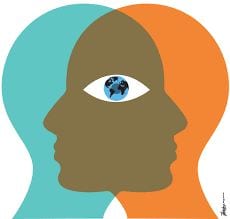Over the last several weeks my vice principal and I have been doing formal evaluations. A lot goes into these evaluations for both the teacher and the admin team. They are often a time of stress and anxiety for teachers. They see it as an evaluation of their performance during a moment in time: The Classroom Observation. It seems that no matter how we phrase it, how much we reassure teachers that if we had concerns they would know and how much we coach and support them through the process the reality is they feel stressed. When we write the evaluation we consult with one another, use examples from informal walkthroughs, team collaboration, parent meetings, and daily interactions. We do not focus on a moment in time we try to look at the BIG picture and focus on the areas of strength and provide fair and specific areas for growth.
For us as an admin team it is never about catching someone doing something wrong but about celebrating the amazing learning and teaching that is happening in the classroom. We sit down with teachers prior to the evaluation to discuss their planning and assessment process, parent communication, professional learning and how they feel that are progressing in their professional development. We let them know exactly what we will be evaluating the classroom environment and the instruction practices happening during the lesson. We offer suggestions and tweaks to the lesson in order to set them up for success. Teachers determine the subject and grade level that we will be observing. Some pick areas of challenge, areas of strength or even take a risk to try something new!
We spend about 40 minutes in each class and try and see a lesson from the beginning to the end. For me I take notes in a narrative format about what I see, hear and wonder during the lesson. I record teacher questions as well as student responses. I walk the room and note how the environment supports student learning. I also look to see if the students have voice, choice and ownership of the classroom or if it is very teacher focused.
During the post observation we always ask the same questions: What do you think went well? What would you change? Where there any surprises? Did the lesson meet your objectives? In our experience teachers are brutally honest and know their areas of strength and areas for growth. They are able to clearly articulate the strengths and challenges of the lesson and what they could do differently the next time. They are also able to see where the students are taking them for their next lesson. They are open to feedback and coaching and want to improve their practice.
It was during one of these debrief meetings this week that a teacher said something to me that was like an epiphany. He had worked in Canada as a teacher for several years and has just started as a PYP teacher. He said in my previous context we were always judged first on our ability to manage a class and student behavior…..in this context it is about our pedagogy first. Lightbulb moment for me…….
He was in my experience absolutely right. In my previous role as principal when I did classroom walkthroughs, hired teachers, provided PD or gave feedback it was often on classroom management, environmental supports, behavior plans or programming for differentiation. The focus was always on how to best support students so they could access the curriculum. We said things like you need to reach them to teach them, what is necessary for some is good for all, we can teach pedagogy if there is classroom management and an understanding of differentiated programming for student needs. Could they control the class? Were they proactive in their strategies for support? Did they have a deep knowledge of student behavior and mental health needs? Were they good at forming relationships with students and creating a community to support ALL learners? Were they resilient? Could they handle difficult students and parents? Were they good problem-solvers?
Don’t get me wrong there is some need for this in my current context but in most cases teachers can establish routines and procedures for their classes in about a month and students just need gentle reminders throughout the year of the Essential Agreements. We review routines and procedures after holidays and breaks from school or when we see things going a bit sideways but the constant need to reinvent the wheel to find strategies that work and to create individualized plans for students behavior is minimal. That is not to say that teachers do not differentiate or create lessons and activities that provide entry points for all students they do….the difference is that they can focus 90% of their time, energy and effort on teaching and learning. That is why their pedagogy needs to be strong!
I know that when you ask teachers who have returned to their previous context whether that is Canada, USA, Australia etc. they can struggle. The shift back to classroom management can be a challenge because their experience is limited or they have not had to put those practices into play as much. They also miss the enjoyment and challenge of the learning and teaching that was front and center.
This makes me think of the importance of context. How do we as leaders insure that we have the best teachers for our context? Do we know our needs and what will work best for our students and families? Is a teacher, a teacher, a teacher and do we believe that we can mold them through coaching and support to be successful in our context? How do we differentiate our support and coaching? Are we able to identify clearly what they need for success? Are we able to shift our focus and mindset as leaders to the needs of our new context and do we have the skills to do so?


